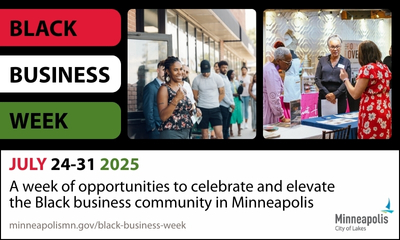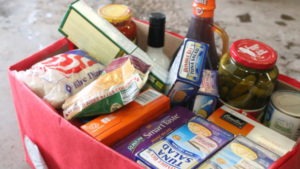In a corner of the basement at Minnehaha United Methodist Church, George Gallagher is organizing boxes filled with non-perishable foodstuffs. He and volunteer Conrad Larson are working to get food to people living in parts of southeastern Minneapolis, people who might otherwise go hungry. Larson is one of the 35 volunteers who take turns working here at MUM’s food shelf.
Gallagher, the church’s Food Shelf director, said that last November, the Food Shelf distributed nearly 26,000 lb. (13 tons) of food to people living in the qualifying area, from Cedar Avenue to the Mississippi River and from Lake Street to the Crosstown. The Nokomis area Food Shelf is open once a week, on Tuesdays from 10 a.m. until 3 p.m.
It’s part of the Minnesota Department of Human Services Office of Economic Opportunity, itself a part of TEFAP, The Emergency Food Assistance Program, a federal program started during the Reagan administration and designed to supplement the diets of low-income residents.
The number of people in need of food is growing. “The number of children has doubled in the last five years. The number of seniors older than 55-years has doubled in the last three years. And, 26% of people coming to our shelves are living in VA housing,” Gallagher said.
He said that sometimes, food shelf clients have no access to kitchen appliances, except for perhaps, a microwave. “People’s stoves go out or they are living in a tent city. We try and give these people one-dish things like pop-top beef stews or beans, things that don’t require a can opener or a kitchen. Sometimes people will take food into a quick stop and heat them in a microwave there,” he said.
Gallagher encourages those who wish to donate to consider items in addition to packaged foods. “We especially need what I call human dignity products, things like tooth brushes and paste, feminine hygiene products and deodorant. A lot of grandparents raising their grandkids need disposable diapers. We can also use oil, sugar and canned goods. Wholesome food is always a need,” he said.
For those who can’t qualify or who don’t want to sign up for government food shelves, there are options.
Renee Beymer, who for 20 years has managed MinneHarvest, said that while the Minnehaha Food Shelf has requirements for clients to get provisions, there are no questions asked at this food giveaway. MinneHarvest’s food distribution program, also operated out of Minnehaha United Methodist Church, is held on the fourth Saturday of each month. None of their food comes from the government, she said. Instead, local partners collect food for distribution, including a cluster of churches in the East Nokomis neighborhood.
Lake Nokomis Lutheran holds an annual food shelf fundraiser and St. James Episcopal on the Parkway, donates 500 lbs. of produce from their garden in warm weather. Both have drop-off boxes to collect donations from members.
Several local businesses also support the effort, including the New French Bakery, which donates bread, and two Nokomis Neighborhood grocery stores. Bergan’s Supervalu and Oxendale’s both have donation bins to collect food from customers.
“We get a load of food from Second Harvest and bread from the New French Bakery, and we hand them out, no questions asked. The Food Shelf has a lot of requirements, since they are connected to the federal government. MinneHarvest does not,” she said.
“We set up tables and set up the food and let people choose. We never know what’s coming on the truck. People come and get a number to hold their place in line and we divide the amount of food people can take by the number of people who show up—but we never know,” she said.
“Sometimes we have to set limits, but we try to make sure that everyone gets the same amount of food,” she said. “In December, we had a lot of apples, lettuce, cereal and chips. Sometimes we get canned goods and pasta sauce.”
Beyer said that they chose the fourth Saturday because that was when seniors on social security would start running out of money. Many, she said won’t sign up for official government food programs.
“A lot of them are on the proud side about asking for help. They wouldn’t come to the food shelf but would come to the food giveaway. We see a lot of seniors and a lot of people with children.” Beyer said that that sometimes, volunteers take food to people who find it hard to get to the donation center.
One source of fresh food during the summer months is the Giving Garden. “The Nokomis East Neighborhood Association (NENA) and St. James On The Parkway Episcopal Church started the Nokomis East Giving Garden in 2017,” said NENA program and communication manager Lauren Hazenson.
“The Giving Garden is run by community volunteers and provides fresh produce to Minnehaha Food Shelf and other area services. The gardeners survey recipients to gather information on preferred vegetables and herbs, then plan the garden for the year accordingly,” she said.
“The commitment and knowledge of our neighborhood Giving Garden volunteers is what allows this project to flourish. They enjoy the opportunity to help their neighbors through tough times while using their gardening skills,” she said.
Russell Smith, store manager at Bergan’s Supervalu, said his store works with the Fort Snelling Lion’s Club. “We collect for the pantry. We just try to help out the neighborhood and the people who need the food. We’ve been doing this for at least 10 years. We probably collect eight to 10 boxes every couple of weeks.”
Volunteers, like Conrad Larson, a member of Minnehaha United Methodist, said he gives his time because he hopes to get food to people who might otherwise go hungry. “One in five children are food insecure,” he said. He helped organize a food drive late last year with young volunteers from Wilder School. “I spoke to a first grader and found that even first graders have more compassion than you’d realize.”
Those wanting to sign up to get food from the Minnehaha Food Shelf need to bring a photo ID or a piece of business mail, such as a utility bill, with their address on it to show they live in the eligible area. Children need to have an ID, such as a medical card or a school paper. Clients are required to sign up once a year as part of the federal government’s Emergency Food Assistance Program.
Both the TEFAP Food Shelf and MinneHarvest are organized through Minnehaha United Methodist Church at 3701 E. 50th St. in Minneapolis. Those who wish to donate food can do so at any of the participating churches, at Bergan’s SuperValu or Oxendale’s grocery. There are also food shelf fundraisers, including annual Lenten food drives. Those wishing to volunteer can contact Minnehaha’s Food Shelf Manager George Gallagher at 612-501-7078 or Renee Beymer at 612-722-1782.























